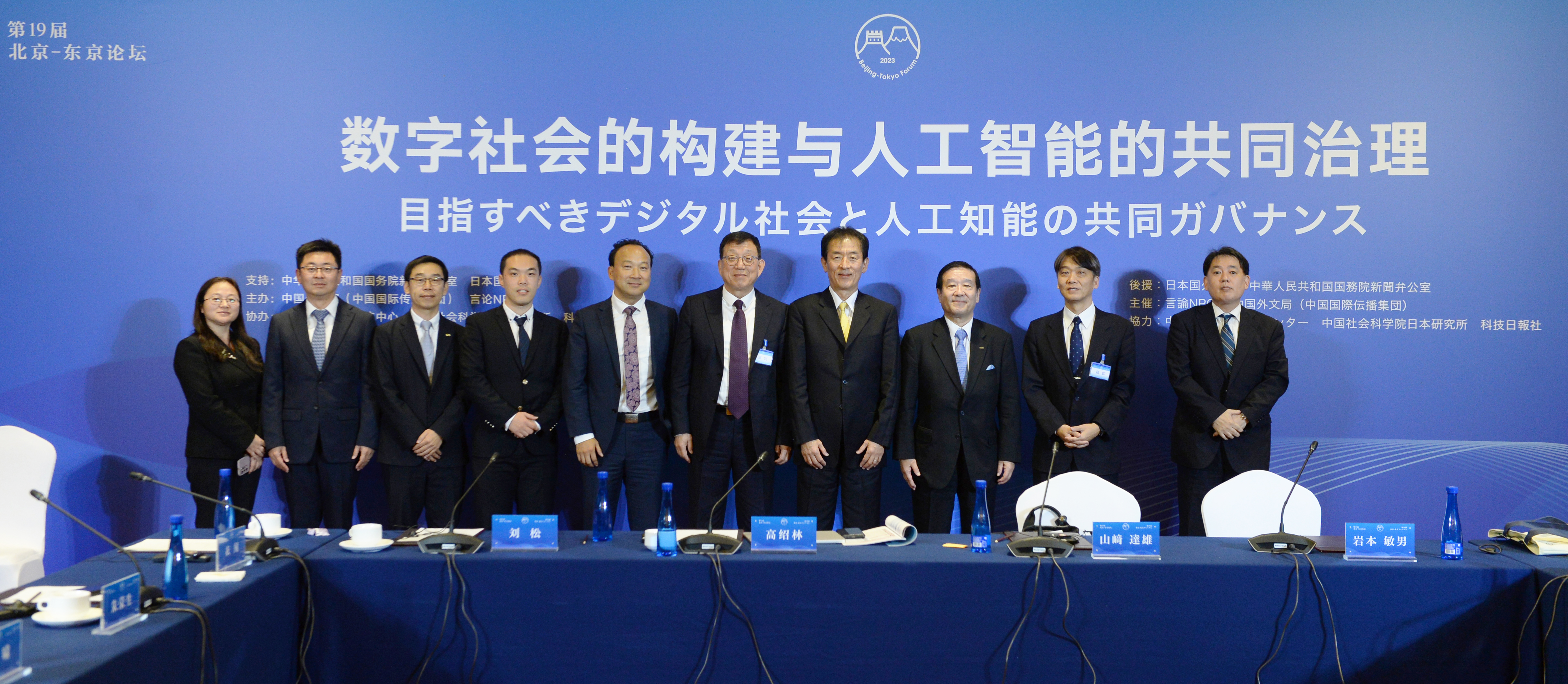AI Governance Should Conform to Human Values

The Digital Economy Forum, a part of the 19th Annual Beijing-Tokyo Forum, is held in Beijing on October 19. (PHOTO: ZHOU Weihai/S&T Daily)
By?GONG?Qian?&?ZHONG?Jianli
"It is a question worth thinking about — how each country manages their AI development, while upholding the principle of the common values of humankind as the rule of joint governance of AI," said Gao Shaolin, a consultant at the Legal Artificial Intelligence Research Center at Peking University, speaking at the Digital Economy Forum, a part of the 19th Annual Beijing-Tokyo Forum, in Beijing on October 19.
The Digital Economy Forum this year focused on construction of a digital society and joint governance of artificial intelligence. The scholars and industry participants from China and Japan shared their insights on the topic, and discussed how two countries strengthen cooperation in building a digital society and AI management.
Challenges and opportunities
AI is changing people's life, work and social structure at an unprecedented speed.
After OpenAI released ChatGPT, generative AI has witnessed an explosive growth, creating a technological innovation boom around the world. According to Goldman Sachs, generative AI can drive global GDP growth by 7 percent, adding 7 trillion USD in GDP, and the AI industry will usher in the 3.0 era.
Yi Chuang, General Manager of Japan, SenseTime Asia Pacific Business Group, said that China has the most active market in generative AI. In the first half of 2023, more than 120 large model AI products were released, including 79 large models with above one billion parameters, and at least 20 general large models.
Though the rapid development of AI technology has brought great opportunities, technical and ethical challenges also pose unpredictable risks on humanity.
Toshio Iwamoto, Principal Executive Advisor of NTT Data Corporation, said that AI could lead to misinformation and joblessness, particularly, the people-to-people relationship will be replaced by the people-to-AI relationship.
Fumihiko Kamio, Nomura Research Institute's Director Research, also said that generative AI would cause major risks in data security and personal information protection and algorithms, along with ethical issues, and intellectual property infringement.
Responding to their concern, Liu Song, Vice president of PingCAP (Beijing) Technology Co. Ltd., said, "It is not AI that replaces human beings, but people who have mastered AI technology that replace people who have not."
People-oriented
Participants agreed that AI development and application should be "people-oriented", thus ultimately serving for the wellbeing of humankind.
Gao said China has always actively advocated "putting people first" and "tech for good". He said that the Global AI Governance Initiative, issued by China on October 18, provode Chinese solution to the AI development. The Initiative systematically outlines China's proposals on AI governance from three aspects, namely, the development, security and governance of AI. He also noted that AI governance can be strengthened through laws, ethics and international cooperation.
Iwamoto said that the use of AI must contribute to the survival, dignity and happiness of human beings, and that security and privacy protection must be ensured.
Inclusive digital society
The construction of a digital society should attach importance to its universality and make AI beneficial to people's livelihood.
Zhang Xiaodan, vice president of Global Tone Communication Technology Co. Ltd., shared a digital transformation solution for the traditional manufacturing industry. Her company provides an Internet platform to help textile enterprises increase their production efficiency and the production of employees by 20 and 8 percent, respectively, and reduce the work intensity of employees by 20 percent.
Zhu Rongsheng, a research associate at the Center for International Security and Strategy of Tsinghua University, said China and Japan can try to put forward AI development and governance principles, so as to meet the needs of East Asia integration. Zhu proposed that both sides could develop the related issues included the Regional Comprehensive Economic Partnership agreement.
Given the social challenges facing both China and Japan, including aging, low birth-rate and economic transformation, Yi said that in the era of AI 3.0, the business communities of the two countries can work together to use new technologies to solve these problems, and prevent privacy protection and technology ethics caused by new technologies.
As for expanding cooperation, Zhu suggested that the attendees can establish a working mechanism. Based on the basic principles in AI of bilateral cooperation as a framework, forum participants could forward a proposal to the policymakers, contributing to the digital economic cooperation between the two countries.







